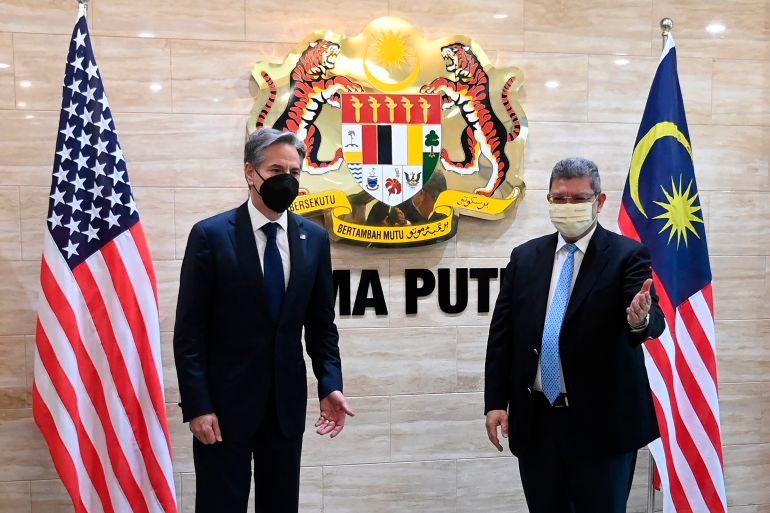US plans ASEAN summit, weighs new sanctions against Myanmar
US secretary of state says the proposed summit will cover issues such as Myanmar, climate change, COVID-19 and investment.

The United States’s top diplomat says President Joe Biden has invited Southeast Asian leaders to a summit to discuss the crisis in Myanmar and is weighing tougher sanctions against the country’s military following its power grab in February.
Antony Blinken made the comments on Wednesday during a trip to Malaysia, where he described the 10-member Association for Southeast Asian Nations (ASEAN) as “essential to the architecture of the Indo-Pacific region”.
Keep reading
list of 4 itemsBlinken slams ‘aggressive’ China; vows stronger Indo-Pacific ties
Russia’s Putin, China’s Xi hail ties amid tensions with West
China warns US it will ‘strike back’ for ‘reckless’ sanctions
“We very much look forward to having a special summit with ASEAN next year,” he said.
ASEAN has been leading diplomatic efforts to resolve the crisis in Myanmar, a country that has been in turmoil since the military overthrew a civilian government led by Nobel laureate Aung San Suu Kyi on February 1.
The power grab prompted protests and pockets of armed resistance that were met with violent suppression.
Blinken said the situation in Myanmar in the 10 months since the coup had “gotten worse” with mass arrests and violence against protesters.
“I think it’s going to be very important in the weeks and months ahead to look at what additional steps and measures we can take individually, collectively to pressure the regime to put the country back on a democratic trajectory,” he said.
As well as discussing the crisis in Myanmar, Blinken said the proposed summit with ASEAN was also expected to cover issues such as the recovery from the COVID-19 pandemic, climate change, investment and infrastructure.
The US secretary of state was in Malaysia on the second leg of what was meant to be a three-nation trip to Southeast Asia aimed at shoring up relations amid Washington’s growing rivalry with China.
But Blinken on Wednesday cut short his brief trip after a COVID-19 case was reported in the press corps accompanying him. Blinken and senior officials tested negative in Kuala Lumpur, where the journalist tested positive.
The secretary of state had been due to hold meetings in Thailand on Thursday but informed his Thai counterpart he would return to Washington to mitigate infection risks “out of an abundance of caution”, a State Department spokesperson said.
In Jakarta on Tuesday, Blinken said the US would expand its military and economic relationships with partner countries in the Indo-Pacific to ensure the region remains open and accessible.
Blinken’s Malaysian counterpart, Saifuddin Abdullah, said Biden’s summit invitation would be discussed when ASEAN foreign ministers meet on January 19. He also called on the regional bloc to act, saying ASEAN must do some “soul searching” about its policy towards member Myanmar.
Blinken was asked specifically about potential sanctions on Myanmar’s state-run oil and gas sector but did not mention the possibility in his response. He did, however, say that the Biden administration is looking “very actively” at designating continuing repression against Myanmar’s Rohingya Muslim population as a “genocide”.

He repeated demands for the Myanmar military to release all of those who had been “unjustly detained”, including democracy leader Aung San Suu Kyi, allow unhindered humanitarian access to areas in need of assistance, end violence against protesters and restore Myanmar “to its democratic path”.
In response to the same question, Abdullah said Malaysia believes that ASEAN must adopt a more coherent position when it comes to Myanmar.
The bloc has long held a policy of non-interference in its members’ internal affairs and often resisted taking action against them.
“I understand that we celebrate the principles of non-interference, but … ASEAN should also look at the principle of non-indifference because what happens in Myanmar is already getting out of Myanmar,” he said, noting that Malaysia is now hosting nearly 200,000 Rohingya refugees.
“We have to do some soul-searching,” he said, expressing hope that the ASEAN foreign ministers meeting in January would be able to clarify the group’s position on Myanmar and lay out clear demands and milestones for the country’s military to meet, along with a specific timeline for completing them.